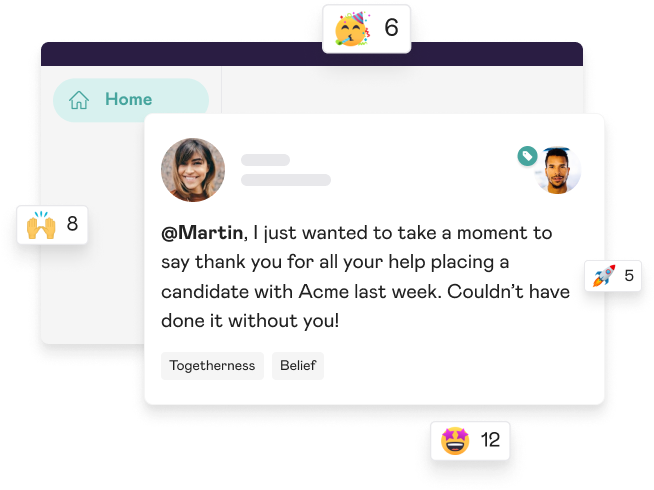An employee engagement survey is a powerful way to find out exactly what your team is thinking and where your strengths and weaknesses lie as a company –but only if you ask the right questions.
How you look for information can greatly impact the kind of answers you receive. For example, if you ask a yes/no question, you will get a yes/no answer.
Sometimes that’s useful, but if you’re hoping to dig into critical issues or longstanding attitudes, more insight is needed. Luckily, putting together a good survey isn’t as difficult as it sounds.
What is an Employee Engagement Survey?
Not sure why you should be using surveys to measure employee engagement in the first place? The answer lies in how meaningful engagement is for success – from hitting weekly goals to improving retention, engaged employees will be happier and perform better.
Zenith recently found that 63.3% of companies find retaining employees harder than hiring them.
How Can an Employee Engagement Survey Help?
Engagement surveys are necessary to create a dynamic workplace and a high-performing team by encouraging open and honest feedback.
It allows everyone to share their thoughts, complaints, and ideas. Not only is this valuable for you, allowing you to see where more support or attention is needed, but it also shows your employees that their voice matters. Especially if you follow up on the answers you receive with positive action.
A recent survey from Gallup found that only 36% of employees felt engaged in the workplace. Worried your employees might feel the same way? It’s time to find out.
Choose Your Survey Questions Carefully
Taking part in a survey uses up energy and goodwill. If your employees feel like you haven’t put the time and effort into making the most of the opportunity, it may make them feel unappreciated – the opposite of what you were aiming for.
Avoid that outcome by crafting an employee engagement survey that is clear, honest and aligned with your values. And be sure to include strong and thoughtful questions too.
What Makes a Good Engagement Survey Question?
The best questions are ones that make answering them as straightforward as possible. This saves everyone time, making it easier for your employees to respond and easier for you to parse their answers at the other end. The top things to think about are:
- Only asking about one thing at a time
- Being unambiguous
- Wording things neutrally and in an un-leading way
- Focusing on things you can make improvements on
It’s a good idea to have a sliding scale of satisfaction for your questions for a more nuanced answer, and always include space for additional comments.
23 Employee Engagement Survey Questions
In an engagement survey, there is no point in beating around the bush – be upfront and get the answers you need.
Questions around employee engagement
1. Do you find your work engaging?
This is a good example of a straightforward question that gets right to the heart of your survey and the reasons you’re conducting it.
2. Do you feel your work contributes to the organisation’s goals?
Feeling like part of a bigger picture can be very valuable, and it’s important to know if your employees feel their contributions are in line.
3. Do you feel like your teammates are engaged in their work?
How engaged one person feels can affect how they see other people. This question can help identify a potential problem.
4. Do you feel like your workload is reasonable for your role?
Understand whether your employees feel overworked or not without framing it as a negative statement or criticism.
5. Would you recommend our organisation as a good place to work?
How employees respond to this question gives great insight into how they are feeling and how engaged they are.
Questions about personal growth and career goals
While employees might be content in their job on a micro level, the macro is essential for long-term happiness and engagement. A survey from ClearCompany found that 94% of employees will stay with a company longer if they feel that their career is being invested in.
6. Can you see a path for developing your career here?
This is a good way to find out whether employees are feeling stuck and demotivated – seeing no room for advancement can have a negative effect even if they are satisfied day-to-day.
7. Do you feel like your role here aligns with your career goals?
If any of your employees say they don’t feel like their role matches their long-term goals, it indicates that it’s time to do a big stock take and realignment.
8. Do you feel your manager wants the best for your growth?
Feeling that a manager or leader genuinely cares about an employee’s career growth can be a massive motivator.
9. Do you have the tools to develop your skills here?
It’s important to know that when you’re trying to support employees, it’s not coming across as all talk and no action. This question reveals whether there are practical concerns.
10. Do you see yourself working here in a year?
When employees don’t feel supported and their goals aren’t aligned with the organisation’s, there’s a decent chance they’ll have their eyes on the door.
Questions about leadership and support
How employees feel about their direct managers and leaders greatly impacts how they feel about the organisation as a whole; these questions can help pinpoint any disconnects.
11. Do you feel you are kept up-to-date with what is happening?
Good leaders know when to keep employees informed and encourage open and honest communication about all aspects of the job.
12. Do you feel safe sharing your thoughts and needs?
This is crucial for a happy team – find out if you’re successfully creating a feeling of psychological safety in the workplace.
13. Do you feel the leaders here inspire and motivate you?
We know how important it is to try and inspire our employees, but a question like this lets you know if your efforts are working.
14. Do you feel like your leaders are good role models?
It’s one thing to talk the talk, but employees like to see you walk the walk too. This is a good way to determine whether that perception is coming across.
15. Do you feel as though your immediate manager cares about you?
Personal connections have a huge impact on well-being at work, and finding out whether your organisation has empathetic leaders or not is very valuable.
Questions about team culture and connectedness
Creating a strong team that is supportive and dedicated is one of the most beneficial things you can do for your company. Use questions like these to determine how your employees feel about each other.
16. Do you feel you learn a lot from your co-workers?
If you have a lot of talented employees, it’s great if they can share their skills and knowledge – find out whether that’s happening or whether it needs some work.
17. Do you feel as though your team recognises your skills?
This is a way to determine whether those talents are obvious to the team. A team-centric employee recognition platform can be a good place to share specialities and skills.
18. Do you feel your team can work through tough conversations?
For a team to thrive, it needs to be able to have tough and positive conversations.
19. Do you feel as though your teammates encourage you?
Peer-to-peer recognition can be such a powerful tool for helping employees feel engaged. This will let you know whether you’ve built a culture that encourages it.
Open-ended questions
This is a good opportunity for employees to let you know what is important to them. Not every respondee will relish open-ended questions, but you may receive some real gems in the answers.
20. Is there anything you’d like us to change?
This is a chance to gather information about things you may not have thought to target as an issue.
21. What do you feel we’re doing right?
It’s good to know what is already working and identify all the spaces with room for improvement.
22. Is there anything we can do to make you feel more engaged at work?
Get right to the heart of what your employees think would help boost their own engagement levels.
23. Is there anything else you’d like to share?
Give people free rein to bring up whatever is important to them – this is important for helping employees feel heard.
How to Conduct an Employee Engagement Survey
Here are a few handy tips to remember when your questions are nailed down, and you’re ready to get going.
Choose your format wisely
There are a lot of online survey platforms that are easy to use and can be adapted for your needs – from reliable favourites like SurveyMonkey, TypeForm or Google Forms – to specialised software.
Deciding which to use will have a lot to do with the size of your organisation and how often you will conduct an engagement survey. Just remember that confidentiality is key.
Make sure everyone knows it’s anonymous
There are times for face-to-face or peer-to-peer feedback, but an engagement survey isn’t one of them. This is a chance for you to get completely unfiltered opinions from your team and the best way to do that is to be entirely and explicitly anonymous.
Give everyone plenty of time
You may be impatient to know your survey results, but the longer you give people to complete it, the more likely you’ll catch everyone. Your survey should be open for a couple of weeks at least to allow for illnesses or booked annual leave.
Send reminders
You’ll want to have your survey open for a while, so you’ll also want to schedule in some reminders for everyone. It’s easy for things like this to slip off the radar, especially when weighed up against client deadlines. It’s also a good idea to ask managers and team leaders to bring it up in meetings and one-to-ones for a personal reminder too.
Show how you will take action
Employees will be much more likely to take a survey seriously and put aside time to answer it properly if they believe you will take action based on the results. Communicate clearly about what you’d like to use the survey to find out and commit to a future date when you’ll make some real changes based on the results.
Employee Engagement Survey Questions: Key Takeaways
- Employee engagement survey questions should align with organisational goals and values to ensure relevance and effectiveness.
- Consider the diversity of your workforce and tailor survey questions to gather feedback from various perspectives and experiences.
- Prioritise simplicity and clarity in survey questions to enhance response rates and facilitate accurate data collection.
Transform your culture with Mo

- Improve employee engagement scores
- Reduce employee churn
- Build a collaborative culture
Mo is an employee recognition and engagement platform that can help leaders improve collaboration and morale, reduce employee churn and drive change.
Our platform creates a vibrant culture by developing team habits, encouraging people to celebrate success, recognise results and appreciate colleagues. Your complete toolkit for connecting and motivating teams in the new world of work. Book a demo with our team today.




